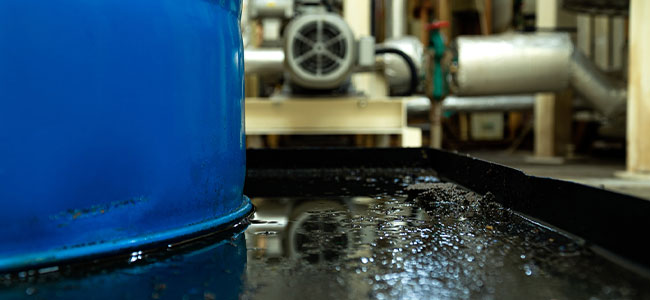
The Dangers of Hydraulic Fluid Leaks: Things to Watch For
While they have broad uses, hydraulic fluids can be a liability for a company if machines start to leak. Here’s what to watch out for and how to prevent future leaks that might compromise workers’ safety.
- By Mia Barnes
- Jan 11, 2024
Hydraulic fluids have become integral to construction, manufacturing, agriculture and numerous other industries. Without them, companies would have less efficiency and power in multiple applications. While they have broad uses, hydraulic fluids can be a liability for a company if machines start to leak. Here’s what to watch out for and how to prevent future leaks that might compromise workers’ safety.
How to Detect Hydraulic Fluid Leaks
Finding leaks and immediately addressing them is crucial for employees’ safety. But what are the warning signs for hydraulic fluid leaks?
- Hearing unusual sounds: The first sign to listen for is an unusual sound. Typically, this means ticking, rumbles or high-pitched whining coming from the hydraulic equipment. The hydraulic system may be leaking air or unable to draw fluid, causing the sounds. In this case, tend to the machine immediately.
- Finding visual evidence: Sometimes, the best bet is to search for visual evidence. Comprehensively inspect the hydraulic system to see what the problem is, considering the leak could originate from numerous sources. For example, one common area to find leaks is in the hoses. While these parts are flexible, they’re susceptible to leak-causing cracks that could originate in numerous spots, depending on the machine. For example, hydraulic pumps and valves could be the leak source. Damaged seals or housing could also contribute to the problem.
- Gauging performance: Another sign of a hydraulic fluid leak is its performance. A leak will likely lead to slower or erratic operations. So use these indicators to gauge leaks. If there isn’t a hydraulic fluid leak, another problem has appeared in the machine. Overheating is another performance indicator the equipment is leaking. When lacking hydraulic fluid, the system will overcompensate and produce more heat.
The Dangers of Hydraulic Fluid Leaks
Hydraulic fluid leaks are dangerous because the organization and its workers are suddenly at risk. Here are three dangers posed by hydraulic fluid leaks.
Damaging Machines
When a machine has a hydraulic fluid leak, it becomes vulnerable to damage in several ways. First, the internal parts will become at risk. The moving parts and pieces inside the machine rely on hydraulic fluid to move smoothly. So losing it to a leak means the lubrication will suffer. Over time, the components will risk collapse.
Fluid leaks can significantly harm other aspects of the facility. For example, hydraulic fluid leaks in farm equipment can negatively affect the soil and harm essential groundwater sources for the animals. Plus, there is an increased risk of slips and falls for those walking around the premises. The National Safety Council says nearly 50,000 workers suffered injuries from a fall in 2020, making it one of the most common workplace accidents in the U.S.
Endangering Others
When a hydraulic fluid leak occurs, one option is to evacuate the necessary rooms to usher others to safety. However, this option may only be available in some situations.
For example, suppose the building has elevators running on a hydraulic system. Hydraulic drive systems typically use less fluid than other mechanisms, but problems can persist anyway. The elevator could cause uncomfortable rides for people inside and even shut down. Having people in the building getting stuck in an elevator would only make matters worse.
Besides shutdowns, leaks can endanger the lives of whoever is around through fire risks if the product contains natural hydraulic fluids. Hydraulic fluid is less flammable than the typical distillate fuel, but it can still cause fires if the temperature gets high enough. For example, airplanes typically have hydraulic fluids with organophosphate compounds. A 2020 study shows their self-ignition point typically exceeds 450 degrees Celsius.
Causing Downtime
Modern business standards have called for maximum production and efficiency from employees. Hydraulic fluid leaks can significantly affect a company’s productivity and cause downtime. Fires, falls and equipment failure are only some of the ways leaks impact a business’s daily operations.
When machines fail, companies must wait for maintenance to fix the problem or replace the equipment entirely. The lost productivity can significantly affect the bottom line, especially for small businesses. Research shows downtime costs about $9,000 per minute, emphasizing the need for preventive maintenance.
How to Prevent Hydraulic Fluid Leaks
Avoiding hydraulic fluid leaks is preferable to save time, money and energy. Here are a few preventive maintenance tips to employ for equipment:
- Inspections: Routine maintenance is an excellent way to detect and mitigate problems before something bad happens. Create an inspection schedule to check the belts, hoses, valves and other moving parts.
- Brand reputation: Choose trustworthy suppliers for your hydraulic fluid equipment. These companies provide more reliable parts and better customer service than unfamiliar businesses selling cheap parts.
- Temperature control: Ensure the fluids remain at a proper temperature to prevent the acceleration of wear and tear.
Remaining Aware of Hydraulic Fluid Leaks
Keeping a smooth operation is essential for the bottom line and employee morale. Hydraulic fluid leaks are one problem that can escalate quickly and damage machinery. Use these warning signs and preventive maintenance tips to protect equipment and, of course, employees.